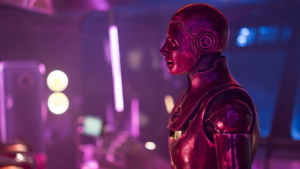
Philip K. Dick’s Electric Dreams – Impossible Planet
 Starring: Geraldine Chaplin, Malik Ibheis, Jack Reynor, Benedict Wong
Starring: Geraldine Chaplin, Malik Ibheis, Jack Reynor, Benedict Wong
Director: David Farr
Review by: Sidney Morgan
This review CONTAINS SOME SPOILERS. Still reading? Ok, you’ve been warned.
Impossible Planet begins at Astral Dreams, a space tourism company run by Andrews (Benedict Wong) and Norton (Jack Reynor), that takes clients to see various space sites. In walks Irma (Geraldine Chaplin) with her robot companion RB29, (Malik Ibheis) who wants to hire them to take her on a tour of Earth. But there’s a snag. You see, Earth was completely destroyed by solar flares. It just doesn’t exist anymore. Thankfully, Irma is deaf and remains unaware of this fact when Andrews blurts it out.
To make the offer irresistible, Irma offers to pay a large sum of money (five year’s worth of salary, each!) to undertake the trip. RB29 enticingly lifts a briefcase, adding that Irma can only pay in cash. Oh, how some things never change. Licking his chops, Andrews decides to grant the really, really old lady (oh, did I fail to mention she’s 342 years old!) her wish. Hmm, right… But remember, Earth doesn’t exist anymore. So begins the con. Or does it?
 Andrews, a slightly reluctant Norton and even RB29, who’s also in on the apparent con, play into granting a dying woman her last wish. But to stop there, and claim it’s nothing more, is to miss part of the story. How else can the shared vision or dream between Irma and Norton be explained? How is Irma’s perception of what is real affected by what the others say? And ultimately, how does Norton begin to perceive and live Irma’s view of reality? Have Irma and Norton managed to connect on some other level of consciousness? There are just too many questions to ignore. Clearly, something deeper is happening here. Granted, the story between Irma and Norton is not present in the original short-story, but Farr would have been aware of recurring themes present in Philip K. Dick’s work, and in that context, this works.
Andrews, a slightly reluctant Norton and even RB29, who’s also in on the apparent con, play into granting a dying woman her last wish. But to stop there, and claim it’s nothing more, is to miss part of the story. How else can the shared vision or dream between Irma and Norton be explained? How is Irma’s perception of what is real affected by what the others say? And ultimately, how does Norton begin to perceive and live Irma’s view of reality? Have Irma and Norton managed to connect on some other level of consciousness? There are just too many questions to ignore. Clearly, something deeper is happening here. Granted, the story between Irma and Norton is not present in the original short-story, but Farr would have been aware of recurring themes present in Philip K. Dick’s work, and in that context, this works.
So, what are the answers? What is the truth about the shared vision? Well, in the words of RB29, “None of us know the truth, Mr. Andrews.” You may think the story is just an elaborate con, or you may think it’s about shared perceptions of realities, or maybe you believe this to be some story about lovers displaced by time. It’s what I love about these ambiguous endings. It generates discussion which can easily evolve beyond the story itself. However, for storytelling purposes, it doesn’t matter. Irma gets her wish, and presumably more. We, the viewers, can rest easy knowing that even in the future, or alternate realities, there are “awwww” moments.
What I Liked
The actors. The interplay between Chaplin and Reynor was well developed, given the time allotment of an hour show. At times fragile looking, but clearly with a mind that’s “sharp as a razor” (as she reminds the crew), Chaplin seems far more astute than her shipmates give her credit for. The dutiful and moral Reynor effectively conveys the internal struggle he faces, until that telling smile announces he’s resolved his issue. And Benedict Wong? Well, he’s Benedict Wong. What more can I say? He’s funny. He’s real. We know him, or someone just like him. (Ya, I’m biased as I do like practically everything he does.)
 Surprising was RB29, a robot who was likely designed and programmed to serve as a companion. But, when faced with telling Irma the truth about ‘Earth’, he lies, presumably because the truth would cause her pain. He opts for her well being instead of the truth. And, when asked about truth, he responds enigmatically, questioning the very nature of it. His selflessness and philosophical nature make him seem far more human-like than robot-like. To some degree, he’s not unlike Rutger Hauer at the end of Blade Runner, displaying a deep understanding of what it means to be human.
Surprising was RB29, a robot who was likely designed and programmed to serve as a companion. But, when faced with telling Irma the truth about ‘Earth’, he lies, presumably because the truth would cause her pain. He opts for her well being instead of the truth. And, when asked about truth, he responds enigmatically, questioning the very nature of it. His selflessness and philosophical nature make him seem far more human-like than robot-like. To some degree, he’s not unlike Rutger Hauer at the end of Blade Runner, displaying a deep understanding of what it means to be human.
Lastly, the atmosphere and setting effectively evolve as the story develops, as though developing a better awareness of reality provides clarity in its understanding. Initially, there’s the dark and dreary office, followed by the interspersed neon lighting in the spaceship. But strikingly in contrast to this is the vibrant, bright and colourful depiction of the waterfall in Carolina (the place Irma longs to see).
What I Liked Less
I read the short story (it’s just over 3000 words long) and understand the few liberties Farr had to take given the need to fill out an hour time slot – the story is just too short. But, in his adaptation, he left out two parts. I agree there’s no need for the war backstory. However, it would have been an interesting twist had he left the discovery of the “round metal disc” (those who want to read the short story will understand) in his adaptation. Though it doesn’t take away from the story, it still would have added an extra layer to the issue of what is true and what isn’t.
Verdict: Watch it. Impossible Planet is a slow developing story without razzle-dazzle, but not every story needs to be like Star Wars or Star Trek. This episode has elements of nostalgia, of romance, mystery, and intrigue. And depending on your perception of what is happening, it is thought-provoking.



